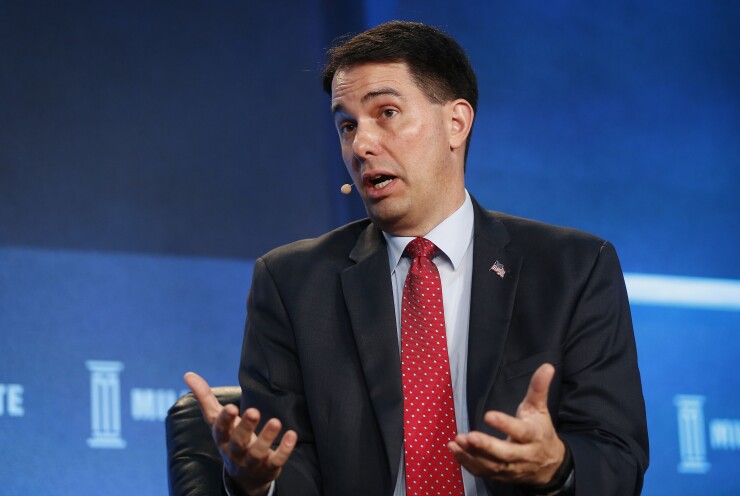CHICAGO – The Wisconsin Building Commission approved more than $1 billion of new money and refunding general obligation bonding authority Wednesday, the first state debt issues that should benefit from a new rating upgrade.
Capital finance director David Erdman said he expects to bring a new money sale for about $300 million to market in the fall with the timing on refunding issues more uncertain as they are driven by market conditions. The commission authorized up to $745 million for refunding purposes.
On Friday, Moody’s Investors Service raised the state’s rating by one level to Aa1 and assigned a stable outlook. It previously had carried a positive outlook. The state is rated at the AA level by the other rating agencies.
The state’s fully funded pension system played a prominent role in the upgrade.
Moody’s said the upgrade “reflects the proven fiscal benefits of the state's approach to granting and funding pension obligations when many other states are experiencing stress from rising costs and heavy liabilities; an economy that delivers steady but moderate growth; conservatively managed budgets; and adequate liquidity.”

“Despite Wisconsin's slightly elevated debt levels, its fixed costs for pensions, debt and retiree health benefits are below the median for Aa1 states and outweigh the credit challenge of the state's negative unassigned fund balances,” Moody’s added.
The state’s certificates of participation, general fund annual appropriation bonds, and taxable pension bonds were raised on notch to Aa2. Appropriation revenue bonds that funded a sports facility were raised to Aa3 and Milwaukee Public Schools debt is now rated A1 and Aa3.
The state has about $10 billion of net tax supported GOs with about half backed by a general obligation pledge. Strains on the state’s credit profile include low rainy day reserve levels combined with negative unassigned balances that provide little financial cushion, lack of certain fiscal best practices such as a binding consensus revenue forecasting process and multi-year fiscal planning, and it has exposure to a cyclical manufacturing economy.
The state has yet to pass a new two-year budget as Gov. Scott Walker and his fellow GOP legislative leaders can’t seem to bridge their differences over how to raise transportation funding.
The budget has taken a backseat to a proposed $3 billion incentive package proposed by Walker that helped lure Foxconn Technology Group to build an up-to-$10 billion electronics plant in the state.
The package is pending before lawmakers in a special session called by Walker. It received pushback in a public legislative hearing last week from some lawmakers that’s escalated in recent days.
It authorizes $252 million in general fund borrowing to speed up planned work on a major interstate in southeastern Wisconsin where the plant is expected to be built and allows the state to put its moral obligation behind some local borrowing.
Company officials and Walker announced the project at a White House ceremony last month. It calls for an estimated $10 billion capital investment to build and equip the facility by 2020 that will produce liquid crystal display, or LED, products.
Walker said it’s expected to result in 16,000 construction-related jobs and 13,000 permanent jobs, $348 million in state and local tax revenues during construction, and then $181 million in state and local tax revenues generated annually.
But the investment commitment comes with a hefty price tag that critics say is not worth it. They were buoyed by a report Tuesday from the non-partisan Legislature Fiscal Bureau that warned the state won’t break even from the tax breaks until 2043. That date is pushed out further depending on the number of employees that come from Illinois.
"The fiscal analysis released today creates new questions on the state’s cash flow and on the state’s ability to ensure a good return on investment for taxpayers,” Assembly Minority Leader Peter Barca, D-Kenosha, said Tuesday. The company has named possible sites in Kenosha County and Racine County.
"We think this is an incredible payoff …. and it's not just about the $10 billion dollar investment, it's about the impact that it has statewide,” Walker said in defense of the commitment.
Walker and the company set a Sept. 30 deadline. The state Assembly is working on amendments and is expected to begin debate next week. Senate Leader Scott Fitzgerald, R-Juneau, said this week his chamber would proceed with caution and he doesn’t know yet if he has the votes. He wants to send the bill to the Joint Finance Committee and wants to tackle the budget first.
On Thursday, Fitzgerald said in a radio interview he would seek additional benchmarks on job creation in the bill.
In a report published Tuesday, Fitch Ratings said the project “could have a positive effect on Fitch's consideration of revenue growth prospects as well as the affordability of debt and pension liabilities for local governments in that region.”
“This assessment measures debt and unfunded net pension liabilities against personal income,” Fitch wrote. “Increased spending power may also drive growth in county sales tax revenues, improving growth prospects for revenues over time.”
Fitch said it does not expect the Foxconn development to result directly in any rating changes for municipalities in the state.





